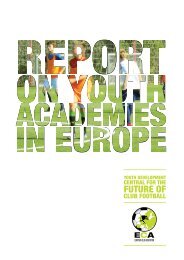10 Years Of German Academy Training.pdf
- No tags were found...
You also want an ePaper? Increase the reach of your titles
YUMPU automatically turns print PDFs into web optimized ePapers that Google loves.
13<br />
be hoped that politicians also recognise<br />
this potential. But it remains our duty to<br />
launch a sports campaign at school level.<br />
Another important issue is demographic<br />
change. The birth rate in Europe<br />
has been dropping since the mid-1960s.<br />
By 2030, we will have a world population<br />
of around nine billion people, of which five<br />
billion will be in Asia. This fact should give<br />
pause for thought, given that there are only<br />
700 million Europeans which represents a<br />
mere <strong>10</strong>% of total world population.<br />
Academies Committee<br />
Members – appointed from the League Association<br />
Chairman<br />
DFL<br />
Andreas Rettig General Manager, FC Augsburg<br />
Holger Hieronymus Director<br />
Andreas Nagel Head of Match Operations<br />
Club representatives Dr Uwe Harttgen <strong>Academy</strong> Director, SV Werder Bremen<br />
Werner Kern Head of Youth Development, FC Bayern Munich<br />
Jürgen Gelsdorf Youth Development Co-ordinator, Bayer 04 Leverkusen<br />
DFB<br />
Matthias Sammer Sports Director<br />
Ulf Schott Department Head of Talent Promotion<br />
Frank Engel Head of Youth Development<br />
Against this backdrop, the topic of<br />
migration becomes even more important<br />
in terms of youth development. However,<br />
opportunities equally present themselves<br />
if we put the potential of older<br />
people to practical use for youth development.<br />
After all, why shouldn’t retired<br />
teachers coach our players?<br />
Energy is another important aspect,<br />
from floodlights (for training and<br />
matches), water (for showers and pitch<br />
maintenance), fuel (for travelling) to<br />
under-soil heating. Here, we will also have<br />
to face the facts and find ways to fund<br />
future requirements.<br />
And in order to find the correct<br />
answers to all these questions, we should<br />
think about setting up a nationwide centre<br />
of expertise. From there, experts in<br />
manage ment, training, medicine, psychology<br />
or lawyers and teachers could be at<br />
the disposal of all talents, acting as their<br />
first point of contact for each relevant<br />
field. Such a centre of competence could<br />
offer 36 academy places per year (one<br />
place assigned to each professional club)<br />
and also fuel the promotion of high potentials<br />
in management, such as provided by<br />
the football coaching programme of the<br />
<strong>German</strong> Sport University Cologne and<br />
that of the football academy Sportschule<br />
Hennef. Figures from the football world<br />
such as manager Uli Hoeness or coach<br />
Ottmar Hitzfeld could also serve as mentors.<br />
This would bring a tremendous boost<br />
and a transfer of know-how. This is something<br />
which also needs to be considered in<br />
the debate about the future of promoting<br />
young, talented players.<br />
The guardians of the academies<br />
It is the objective of the Academies Committee to improve<br />
the promotion of young talent and make it more efficient.<br />
Representatives from the clubs, the DFB and the DFL are working<br />
together on the future of <strong>German</strong> football.<br />
Since the death of Rolf Rüssmann, President of the Academies Committee since<br />
2002, in October 2009, Andreas Rettig has presided over the panel. The 47-yearold<br />
general manager of FC Augsburg was the ideal choice for the job. After all, at the<br />
beginning of the millennium he had already done the job for two years, not least on<br />
account of the establishment of the Freiburg School of Football, where he was the<br />
recognised authority in the field of youth and elite player development.<br />
The Committee examines the academies of the clubs and joint stock companies of<br />
the Bundesliga and Bundesliga 2, providing for the constant optimisation of youth<br />
education and dealing with the harmonisation with other talent promotion programmes<br />
of the <strong>German</strong> Football Association (DFB).<br />
The Committee is made up of highly qualified experts from the world of football.<br />
Sitting on the Committee board are, from within the ranks of the <strong>German</strong> Football<br />
League (DFL), Director Holger Hieronymus, as well as Andreas Nagel, Head<br />
of Match Operations. The Bundesliga clubs are represented by the Head of Youth<br />
Development at FC Bayern Munich, Werner Kern and Jürgen Gelsdorf, Youth<br />
Development Co-ordinator at Bayer 04 Leverkusen, as well as Dr Uwe Harttgen. The<br />
former Bundesliga player is currently <strong>Academy</strong> Director at SV Werder Bremen and<br />
successfully got a PhD in Philosophy and Psychology.<br />
A leading part of the development of youth work is done by Matthias Sammer,<br />
Sports Director at the DFB. The former title-winning coach of Borussia Dortmund<br />
serves as the connection between the academies of the Bundesliga clubs and the<br />
<strong>German</strong> junior national teams. Problems concerning the scheduling of international<br />
matches can thus be solved directly. Along with Sammer the DFB is represented by<br />
Ulf Schott, Department Head of Talent Promotion, and Frank Engel, Head of Youth<br />
Development.<br />
The objectives of the Committee are extensive. Rettig and his team must plan ahead<br />
for the next decade of youth player development. The Committee addresses current<br />
issues such as saving energy, demographic changes and the constant improvement<br />
of the ties between football and education.




